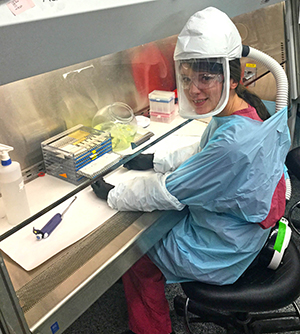COVID Research Simulating Virus on Common Library, Museum Materials Published in Journal of Applied Microbiology
Findings from Battelle, IMLS, OCLC Project Mark Two-Year Anniversary of the Pandemic

Washington, DC—When libraries, archives, and museums were seeking reliable information to help them make informed decisions about how to operate amid the COVID-19 pandemic, OCLC, the Institute of Museum and Library Services, and Battelle formed a partnership to help. Results of that work have now been published in the Journal of Applied Microbiology.
The REALM (REopening Archives, Libraries, and Museums) project came together in April 2020, when little was known about transmission of the virus. Since then, project partners have been producing scientific information to support libraries, archives, and museums to aid local decision-making regarding operations during the pandemic.
“Within a few months after the start of the pandemic, this research began to help museums and libraries pave the way forward,” said Scott Carey, Chief Operations Officer at IMLS. “So much was unknown. As it turns out, the project tested virus load rates similar to the Delta variant before Delta even existed. As we pass the two-year mark and move into the next phases of the pandemic, I’m proud that these test results are being formally recognized within the scientific community and will contribute to a better understanding of COVID-19 and its potential impacts to the society we live in.”
As part of the REALM project, researchers at Battelle studied the effects of ambient or altered environmental conditions on the inactivation of the SARS-CoV-2 virus applied to materials, including books, DVDs, file folders, glass, and plastic. The research found that the attenuation rate for materials held at colder temperatures was significantly slower compared to the attenuation rate at warmer and ambient temperatures.
“These results used scientific methods to demonstrate a low cost, simple-to-implement means of material decontamination for items not compatible with common liquid disinfectants for libraries, archives, and museums as they considered a responsible re-opening process for the communities they serve,” said Will Richter, a Battelle biologist who led the team of researchers.

While contamination through materials is not considered the primary route of exposure for SARS-CoV-2, certain populations such as persons with compromised immune systems or children may be at increased risk from this mode of transmission. The use of natural environmental conditions as an approach to decontaminate or inactivate other biological organisms has been previously studied and offers advantages of safe deployment as well as rapid scalability.
“The goal of the REALM project has been to provide science-based information about the coronavirus to help libraries, archives, and museums determine the best path forward for their communities,” said Skip Prichard, OCLC President and CEO. “These institutions face unique operational challenges, such as circulating thousands of physical materials among thousands of visitors. Findings from this study have helped inform the communities we serve, and this article in the Journal of Applied Microbiology is a significant contribution to the broader scientific community.”
Since its inception, the REALM project has shared test results and other relevant scientific information about the virus as they become available. In addition to conducting lab tests on materials, the project has tracked scientific literature on issues of transmission, decontamination, vaccines and variants, and has collected illustrative examples that helped libraries, archives, and museums mitigate COVID-19 exposure to staff and visitors.
The REALM project is supported by the Institute of Museum and Library Services (IMLS), the primary source of federal funding for museums and libraries; and OCLC, a nonprofit library technology and research organization; in partnership with Battelle, a not-for-profit, independent global scientific research and development organization.
More about REALM and project updates are posted at oc.lc/realm-project.
About the Institute of Museum and Library Services
The Institute of Museum and Library Services is the primary source of federal support for the nation’s libraries and museums. We advance, support, and empower America’s museums, libraries, and related organizations through grantmaking, research, and policy development. Our vision is a nation where museums and libraries work together to transform the lives of individuals and communities. To learn more, visit www.imls.gov and follow us on Facebook and Twitter.
About Battelle
Every day, the people of Battelle apply science and technology to solving what matters most. At major technology centers and national laboratories around the world, Battelle conducts research and development, designs and manufactures products, and delivers critical services for government and commercial customers. Headquartered in Columbus, Ohio since its founding in 1929, Battelle serves the national security, health and life sciences, and energy and environmental industries. For more information, visit www.battelle.org.
About OCLC
OCLC is a nonprofit global library organization that provides shared technology services, original research, and community programs so that libraries can better fuel learning, research and innovation. Through OCLC, member libraries cooperatively produce and maintain WorldCat, a comprehensive global network of data about library collections and services. Libraries gain efficiencies through OCLC’s WorldShare, a complete set of library management applications and services built on an open, cloud-based platform. It is through collaboration and sharing of the world’s collected knowledge that libraries can help people find answers they need to solve problems. Together as OCLC, member libraries, staff and partners make breakthroughs possible.